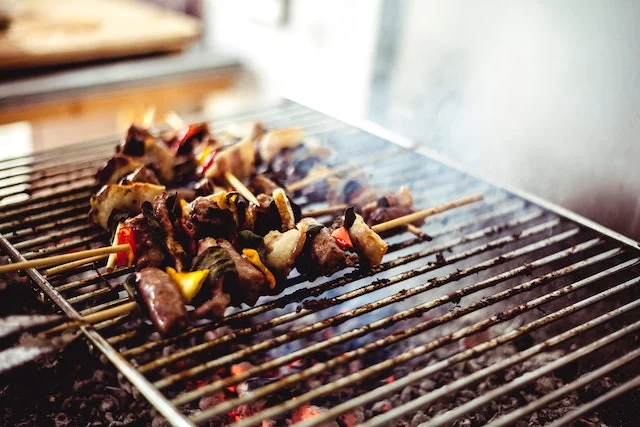Information
Charcoal Grills Vs Propane Grills

Outdoor grilling, a cultural cornerstone, offers convivial meal preparation. Charcoal and propane grills, prominent choices, yield distinct experiences with pros and cons. Understanding these nuances aids grill enthusiasts in aligning choices with personal inclinations, culinary methods, and aspirations.
Table of Contents
Charcoal Grills
Charcoal grills epitomize tradition, evoking a sense of nostalgia reminiscent of campfires and barbecues of yore. These grills exhibit a straightforward design, typically comprising a metal body, a cooking grate, and a lower chamber designed for charcoal placement. Among the most captivating attributes of charcoal grills is their unparalleled ability to imbue food with a distinctive flavor and aroma. The smoky essence that permeates meats and vegetables imparts an authentic and tantalizing taste that resonates deeply with grill enthusiasts.
Furthermore, charcoal grills are renowned for their capability to attain higher cooking temperatures, rendering them exceptionally suitable for tasks like searing steaks and other meats. Additionally, they often present a more cost-effective initial investment and boast enhanced portability, outshining their propane counterparts in these respects.
Propane Grills
On the opposite end of the spectrum, propane grills epitomize contemporary convenience and operational efficiency. These grills harness propane gas as their fuel source, resulting in accelerated preheating periods and precise mastery over temperature regulation. Propane grills come outfitted with burners and control knobs that facilitate seamless adjustments to heat intensities, empowering users to effortlessly execute a diverse array of culinary techniques.
The swift ignition process proves particularly advantageous for spontaneous grill sessions or weekday evening dinners. Furthermore, propane grills consistently deliver a more sanitary cooking encounter due to their minimal generation of residual ash. This type of grill also offers a versatile range of options, as select models incorporate supplementary elements such as side burners and rotisseries, thus broadening the expanse of culinary prospects available.
Factors to Consider When Choosing
The Santa Maria Grill, deeply rooted in tradition, serves as a testament to the art of grilling, accommodating both charcoal and propane fuel sources. When deliberating between charcoal and propane grills, numerous factors warrant consideration. Individuals ought to evaluate their culinary inclinations and objectives. Should a robust, smoky flavor be of utmost importance, opting for a charcoal grill may prove preferable. Conversely, those who prioritize expediency and swifter cooking durations may find propane grills more attractive.
Furthermore, the culinary techniques one intends to utilize, encompassing searing or gradual cooking, should also influence the decision-making process. Additionally, prudent deliberation should encompass aspects such as financial considerations, available space, and the requisites of portability when endeavoring to select the optimal grill to align with one’s requirements.
Maintenance and Cleanup
Taking into account maintenance and hygiene is of paramount importance when deliberating between charcoal and propane grills. Charcoal grills typically yield a greater quantity of ash, necessitating regular cleaning to uphold optimal airflow and uniform heat distribution. The process of removing ash and residual matter post each use can be time-intensive. Conversely, propane grills yield fewer residues, resulting in a comparatively uncomplicated cleaning process. The streamlined maintenance regimen of propane grills, attributed to their minimal ash generation, resonates particularly well with individuals who prioritize an untroubled grilling experience.
Environmental Impact
When assessing the environmental implications of charcoal and propane grills, it is imperative to encompass an examination of both the production procedures and emissions generated during usage. The process of charcoal production frequently entails the felling of trees, contributing to deforestation and engendering adverse environmental ramifications.
Furthermore, the combustion of charcoal releases an elevated quantity of carbon dioxide and particulate matter into the atmosphere when compared to propane. In contrast, propane serves as a cleaner-burning fuel source, resulting in reduced emissions and a diminished carbon footprint. Consequently, for conscientious consumers with a focus on environmental sustainability, propane grills may better align with their core values in preserving the ecosystem.
Versatility and Accessories
While the primary emphasis frequently centers on the inherent cooking technique, it’s worth considering an additional aspect – the breadth of versatility and the accessibility of accompanying accessories tailored to each grill category. Propane grills notably excel in offering heightened adaptability owing to their inclusion of supplementary features such as side burners, rotisseries, and warming racks. These supplementary components inherently broaden the spectrum of culinary preparations that can be concurrently undertaken, thereby enhancing the convenience embedded within your grilling sessions.
In contrast, charcoal grills, though characterized by a more fundamental design, possess their potential for innovative use through the incorporation of smoking chips and chunks. This infusion of smoky nuances presents a distinctive flavor profile to your dishes. Ultimately, contingent upon your inclination towards augmented functionalities and diverse culinary methodologies, the respective versatility of either grill variant may wield substantial influence in your ultimate decision-making process.
Conclusion
Amidst the sounds of sizzling outdoor grills, choosing between charcoal and propane hinges on personal taste. Both offer unique advantages catering to different desires. As sparks rise and tempting aromas fill the air, no grill proves universally superior; individual preferences, goals, and circumstances guide the decision. By experimenting with techniques on both types, grill enthusiasts discover a world of possibilities, ensuring each cookout becomes a savored experience.
To know more about keep reading Lemony Blog.

-

 Business3 years ago
Business3 years agoHow to Do Long-Distance Moves with Children
-

 Travel2 years ago
Travel2 years agoQuick Guide: Moving To Santa Rosa?
-

 Real Estate3 years ago
Real Estate3 years agoWhy Dubai Festival City is a Great Neighbourhood for Young Learners
-

 Business3 years ago
Business3 years agoIs Guest Posting a Good Inbound Marketing Strategy?
-

 Business1 year ago
Business1 year agoThe Ultimate Guide To Thriving In Your Printing Franchise
-

 Business1 year ago
Business1 year agoExploring The Benefits And Challenges Of Restaurant Franchising
-

 Tech3 years ago
Tech3 years agoCyber Table That Will Change Your Life
-

 Lifestyle1 year ago
Lifestyle1 year agoDallas’ Hidden Gems: 6 Must-Try Restaurants Off The Beaten Path!









Recent Comments